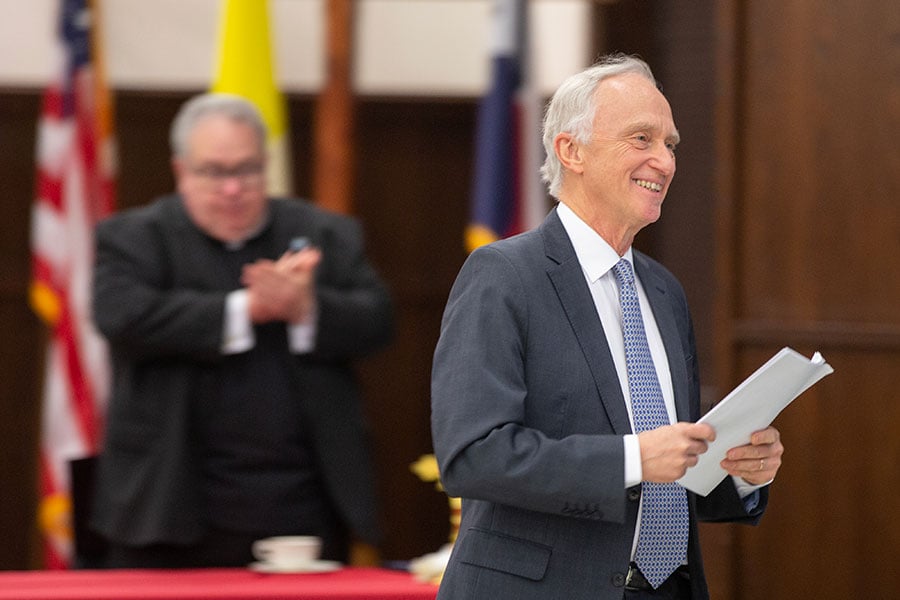Archduke recounts life of grandfather, Blessed Karl I, as inspiration for Catholic youth

Archduke Carl Christian of Austria visits Fort Worth to give a presentation at the St. Patrick Parish Hall about his grandparents Emperor Karl I of Austria, who has been beatified, and Empress Zita, Karl’s wife, who is named a Servant of God. The presentation was Wednesday, March 29, 2023. (NTC/Rodger Mallison)
FORT WORTH — Presenting to a rapt audience of young people in the parish hall of a North Texas cathedral might be one of the last places some would expect to find a senior member of one of Europe’s oldest and most renowned royal families, yet there was a nearly palpable feeling in that room that this was exactly where Archduke Carl Christian of Austria needed to be.
As I sat and listened in that same audience, hearing one of the most profound testimonies of witness to the Catholic faith that I have ever heard, I wished that more of the faithful, particularly members of my own troubled generation, could be present with me.
For readers who may be unaware, Archduke Carl Christian is a member of the Habsburg family, who ruled numerous kingdoms and territories in Europe and beyond for nearly a thousand years. Just to give an idea of the extent of the family’s holdings, the Habsburgs have, at various times, ruled the lands which constitute the modern countries of Austria, Hungary, Germany, Czechia (formerly the Czech Republic), Slovakia, Croatia, western Ukraine, southern Poland, Spain, the Netherlands, and even Mexico and portions of South America. Since the close of the First World War, however, the Habsburgs no longer retain any political authority, yet they remain a strong moral pillar for many of the nations once under their care. As it happens, acting as a source of inspiration is not new for them. Archduke Carl Christian’s grandfather is Blessed Karl of Austria, also known as Emperor Karl I: the only lay head of state to have been beatified by the Church.
Coming to power during one of history’s most tempestuous periods (amidst the turmoil of World War I), Emperor Karl was faced with crisis after crisis. His first priority was to do everything he could to stop the conflict from progressing. Yet when it became apparent that Europe was to descend into the darkness of war, Blessed Karl did not hide from his duties. All the while his wife, Empress Zita of Bourbon-Parma (who holds the title Servant of God), supported him and their children every step of the way, making sure they were educated and brought up in the faith.

As the Great War raged on, Emperor Karl could be seen personally on the battlefield boosting the morale of his troops, often himself helping tend to the wounded. When he was not on the front lines, he worked to establish the world’s first ministry of social affairs, demonstrating a charitable heart sensitive to the needs of the poor. During wartime negotiations, his was often one of the few voices continually urging reconciliation and peace. All of this is to say, Blessed Karl never allowed the circumstances of life, even such overwhelming ones as he and his family continually had to face, to compromise his Christian virtue.
At the conclusion of the war, Blessed Karl, Servant of God Zita, and their children were exiled to the island of Madeira off the coast of Portugal. After taking a walk one rainy day, the Emperor fell ill with the flu, which unfortunately progressed into pneumonia. On Holy Saturday of 1922, Blessed Karl passed away. He was only 34 years old.
During his presentation, Archduke Carl Christian emphasized the importance of moral bravery, of not being afraid to live a life aligned with our beliefs which, in our day, feels as though it is becoming harder and harder to do.
After their marriage, Blessed Karl told Zita, “We must help each other get to heaven.” Apart from being a masterful way of phrasing the spiritual commitment made by a husband and wife in the covenant of marriage, this statement may also be understood as a distillation of Catholic moral life. Each of us is called to aid in the salvation of those around us. This message is especially important for youth, who were the intended primary audience of the Archduke’s presentation.
Whether we be the rulers of a multinational empire like Blessed Karl and Servant of God Zita, or "everyday" people like ourselves, through our baptism God calls each of us to lives of heroic virtue.
